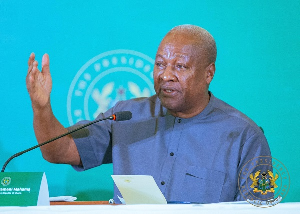The Institute for Democratic Governance (IDEG) has entreated political parties to formulate realistic and development oriented manifestoes that would address development challenges and better the lot of Ghanaians.
It said over the years political parties made unrealistic and adhoc manifestoes without any well defined road map for their implementation with a view of luring the electorate to vote for them during national elections.
The Executive Director of IDEG, Dr Emmanuel Akwetey, said this when he made a presentation on the Proposed Amendment of the 1992 Constitution and the Urgency for Multi-party Governance Reforms, at a stakeholders forum in Takoradi.
The event was organised by IDEG, in collaboration with Civic Forum Initiative and other partners, which brought together heads of department, traditional rulers, assembly members, non-governmental organisations, faith-based organisations, youth groups and the media.
Dr Akwetey said political parties had become more of election machines without paying much attention to policies and programmes that would effectively address development challenges of the country.
In view of this, IDEG had made a number of proposals to deal with the challenges, including the mandatory formulation and publication of political parties’ manifestoes that would be translated into medium term development policies and programmes as basis for campaigning and educating the public.
It proposed that the state should establish a multi-party commission to regulate political parties activities and monitor how they would implement those programmes and policies in order to serve as basis for electing any particular party to govern the country.
Therefore, there was a proposal for the establishment of a multi-party democracy fund to support the political parties to execute their manifestoes and mandatory holding of annual political parties’ conference as a platform for them to account to the citizenry resources entrusted to them.
Dr Akwetey believed this would compel the parties to become more policy and development oriented agents so as to end the over concentration on election campaigns and create space for discussing and thinking through issues that would fast-track national development and ultimately reduce poverty.
“This will mitigate extreme partisanship and promote communal and national cohesion as well as improve public service delivery and inclusive development as dividend of the hybrid multi-party system of governance," he said.
He proposed the strengthening of state institutions such as the Police Service, Commission on Human Rights and Administrative Justice, National Development Planning Commission, and Electoral Commission to make them more professional and impartial to fight corruption and protect them from party control.
He called for the election of metropolitan, municipal and district chief executives by the electorate to make them more transparent, accountable and responsive to the needs of the people, instead of working as surrogates of the ruling government.
Mr Kwesi Jonah, a Senior Research Fellow of IDEG and former Head of the Political Science Department, University of Ghana, said the Constitution Review Commission (CRC) was formed in 2010 to solicit inputs from the general public towards the review of the 1992 Constitution in order to address certain gaps and weaknesses inherent in it.
He said although the CRC had completed and presented its report to the Government with subsequent issuance of Government White Paper, there was the need for more time to deliberate and take fresh suggestions because the 97 provisions penciled down for amendment would not comprehensively address the operational and electoral challenges the country was facing.
He said the issue of election violence had threatened the peace and security of the country since 2008, therefore, there was the need for electoral reforms to cure the Winner-Takes-All system and promote inclusive governance.
He, therefore, asked the Constitution Review Implementation Committee (CRIC) to publish both the entrenched and non-entrenched provisions identified for amendment so that the people would make the right choice during the national referendum.
The participants lauded the efforts of IDEG and its partners for the initiative and entreated the CRIC to consider fresh proposals to be factored into the amendment process to ensure a holistic exercise.
Politics of Monday, 1 September 2014
Source: GNA













